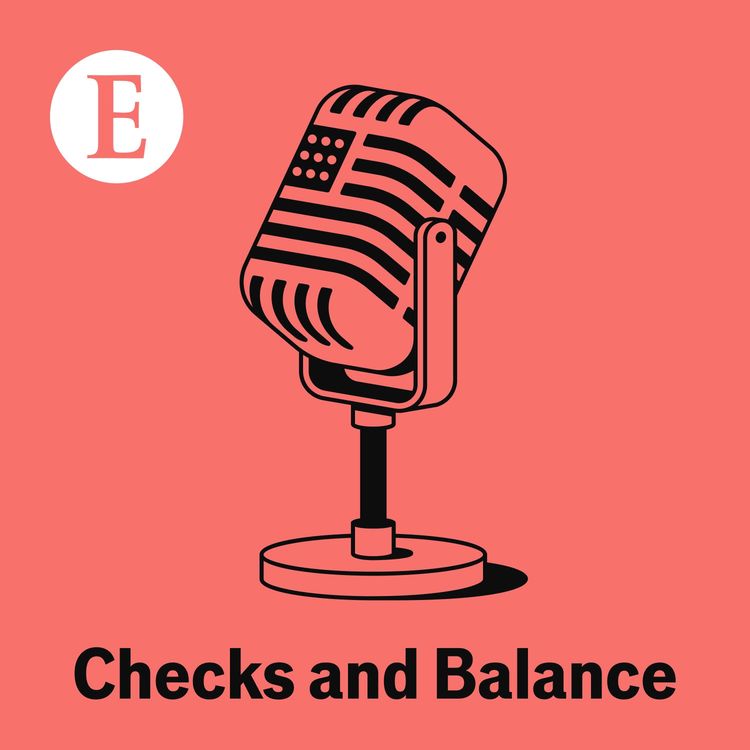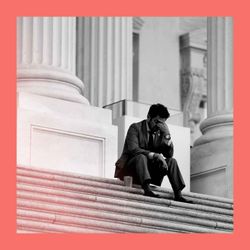Share

Checks and Balance from The Economist
Veepstakes: picking a running-mate
With Kamala Harris all-but-confirmed as the Democratic Party’s candidate for president, attention has turned to who she’ll add to the ticket. It’ll be one of the most important decisions of her campaign. How could her running-mate affect the election?
Charlotte Howard hosts with Idrees Kahloon and Adam O’Neal. They’re joined by James Hamilton, who has vetted running-mates for four Democratic nominees, and The Economist’s James Bennet.
Runtime: 48 mins
Transcripts of our podcasts are available via economist.com/podcasts
Listen to what matters most, from global politics and business to science and technology—subscribe to Economist Podcasts+.
For more information about how to access Economist Podcasts+, please visit our FAQs page or watch our video explaining how to link your account.
More episodes
View all episodes

319. Why Congress just isn’t any fun
45:34||Ep. 319America’s legislature is ineffective, and unsatisfying for the people serving in it. A record number of lawmakers will leave and never return at the end of this term. Congressional leadership has taken over the writing of bills. And fundraising consumes the rank and file’s time. So who still wants the job? And what can make Congress effective again?Guests and hosts: Jon Fasman, senior culture correspondent, former Washington correspondentJames Bennet, Lexington columnist, co-host of Checks and BalanceSamuel Beal, Washington correspondentPaul Begala, former adviser to President Bill ClintonTopics covered: CongressTax Reform Act of 1986Political polarisationTranscripts of our podcasts are available via economist.com/podcastsListen to what matters most, from global politics and business to science and technology—subscribe to Economist Podcasts+ For more information about how to access Economist Podcasts+, please visit our FAQs page or watch our video explaining how to link your account.
318. MAHA’s first annual checkup
45:11||Ep. 318Health Secretary Robert F. Kennedy Jr. has been in office for one year. He’s introduced a double-dose of scientific skepticism, but has he made America healthy again? He promised in his confirmation hearing to do just that. What’s the long term prognosis for trust in American health institutions?Guests and hosts: Charlotte Howard, New York bureau chief, co-host of Checks and BalanceJames Bennet, Lexington columnist, co-host of Checks and BalanceStevie Hertz, US policy correspondentLarry Levitt, executive vice president KFFDaniella Raz, US correspondent Topics covered: What’s changed in RFK’s first yearRising insurance premiums and vaccine skepticismThe political effect of RFK’s health policiesTranscripts of our podcasts are available via economist.com/podcastsListen to what matters most, from global politics and business to science and technology—subscribe to Economist Podcasts+ For more information about how to access Economist Podcasts+, please visit our FAQs page or watch our video explaining how to link your account.
317. All in: America bets on prediction markets
48:28||Ep. 317Americans will bet upwards of an estimated $2 billion on the Super Bowl. It’s the biggest betting day of the year, but since the Supreme Court authorised sports betting in 2018, Americans have taken to gambling year round. And now, on prediction markets, they’re wagering on politics too.Charlotte Howard hosts with James Bennet and Dan RosenheckTranscripts of our podcasts are available via economist.com/podcastsListen to what matters most, from global politics and business to science and technology—subscribe to Economist Podcasts+ For more information about how to access Economist Podcasts+, please visit our FAQs page or watch our video explaining how to link your account.
316. Blocks of ICE: the fallout from Trump’s deportation agenda
47:28||Ep. 316The White House has shaken up its immigration ranks in Minnesota. But whatever the outcome there, ICE has become a gargantuan operation that operates with scant oversight (not unlike the FBI long ago). We ask how the events in Minneapolis have shifted popular perception of the administration’s agenda, and whether other branches of government might at last act to constrain it.Charlotte Howard hosts with Steve Coll and James Bennet.Transcripts of our podcasts are available via economist.com/podcastsListen to what matters most, from global politics and business to science and technology—subscribe to Economist Podcasts+ For more information about how to access Economist Podcasts+, please visit our FAQs page or watch our video explaining how to link your account.
Trailer: Boss Class Season 3
02:18|AI is changing how we work. It's turning us all into managers. Be a good one.The Economist’s management columnist, Andrew Palmer, takes on the bots in the third season of Boss Class. From cloning to coding, agents to entry-level jobs, he tackles the threat head on and figures out how to turn anxiety into opportunity. Along the way he meets bulls and bears and the people who can help you to master management in the age of AI.Full Season 3 out 29th January 2026.To listen to the full series, subscribe to Economist Podcasts+.https://subscribenow.economist.com/podcasts-plusIf you’re already a subscriber to The Economist, you have full access to all our shows as part of your subscription. For more information about how to access Economist Podcasts+, please visit our FAQs page or watch our video explaining how to link your account.
315. Minnesota ICE: crackdown in the Twin Cities
46:55||Ep. 315Most people reckon Minnesota’s immigrant population is smaller than Texas’s or Florida’s. But those two states, which voted for Donald Trump in 2024, have been spared the large-scale immigration crackdown that’s fallen on Minnesota. Weeks after an ICE agent killed a demonstrator, tensions remain high. Will the White House de-escalate?Charlotte Howard hosts with James Bennet.Transcripts of our podcasts are available via economist.com/podcastsListen to what matters most, from global politics and business to science and technology—subscribe to Economist Podcasts+ For more information about how to access Economist Podcasts+, please visit our FAQs page or watch our video explaining how to link your account.
314. Cheap shots: the political fight over rising prices
46:33||Ep. 314President Trump has called affordability a hoax. Democrats are planning to hammer the theme ahead of the midterm elections. But the data show the problem is not as real as people think. Which party can gain the advantage in a fight over perceptions?John Prideaux hosts with Charlotte Howard and James Bennet.Transcripts of our podcasts are available via economist.com/podcastsListen to what matters most, from global politics and business to science and technology—subscribe to Economist Podcasts+ For more information about how to access Economist Podcasts+, please visit our FAQs page or watch our video explaining how to link your account.
313. Crude behaviour: Trump’s Venezuelan adventure
49:15||Ep. 313America’s capture of Venezuelan dictator Nicolas Maduro is the clearest example yet of the emerging “Donroe doctrine”. It’s not about promoting democracy. Instead, it’s about dominance and grabbing resources. What are the costs of a short-term win? John Prideaux hosts with Charlotte Howard and James Bennet.Transcripts of our podcasts are available via economist.com/podcastsListen to what matters most, from global politics and business to science and technology—subscribe to Economist Podcasts+ For more information about how to access Economist Podcasts+, please visit our FAQs page or watch our video explaining how to link your account.
312. Ameritocracy: a conversation with Raj Chetty
32:36||Ep. 312Raj Chetty has studied economic opportunity in America for two decades. He’s an economist at Harvard University, where he runs the Opportunity Insights lab. As America prepares to mark its 250th birthday this year, he joins us for a special episode to discuss whether the country is living up to its original promise: that anyone, no matter where they’re from, can work their way to the top.Host: John Prideaux. Guest: Raj Chetty.Transcripts of our podcasts are available via economist.com/podcastsListen to what matters most, from global politics and business to science and technology—subscribe to Economist Podcasts+ For more information about how to access Economist Podcasts+, please visit our FAQs page or watch our video explaining how to link your account.